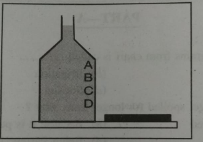If the density of air at a point through which a sound wave is passing is maximum at an instant, the pressure at that point will be
minimum
same as the density of air
equal to the atmospheric pressure
maximum
The correct Answer is:D
To solve the question, we need to understand the relationship between density and pressure in the context of sound waves traveling through air. Here’s a step-by-step breakdown:
Step 1: Understand Sound Waves
Sound waves consist of alternating compressions and rarefactions. In a compression, air molecules are pushed closer together, resulting in a higher density. In a rarefaction, air molecules are spread apart, resulting in a lower density.
Hint: Remember that compressions lead to higher density and rarefactions lead to lower density.
Step 2: Analyze the Given Condition
The question states that the density of air at a point is maximum at a certain instant. This means that we are at a point of compression in the sound wave.
Hint: Identify that maximum density corresponds to the compression phase of the sound wave.
Step 3: Relate Density and Pressure
According to the ideal gas law and the principles of fluid dynamics, pressure is directly proportional to density. This means that when the density of air increases (as in the case of compression), the pressure also increases.
Hint: Recall that pressure (P) is directly proportional to density (ρ), so if density increases, pressure must also increase.
Step 4: Conclusion
Since the density is maximum at the point in question, the pressure at that point will also be maximum. Therefore, the correct answer to the question is that the pressure will be maximum.
Hint: Look for the option that states "maximum pressure" as it directly correlates with maximum density.
Final Answer
The pressure at that point will be maximum.
Sound waves consist of alternating compressions and rarefactions. In a compression, air molecules are pushed closer together, resulting in a higher density. In a rarefaction, air molecules are spread apart, resulting in a lower density.
The question states that the density of air at a point is maximum at a certain instant. This means that we are at a point of compression in the sound wave.
According to the ideal gas law and the principles of fluid dynamics, pressure is directly proportional to density. This means that when the density of air increases (as in the case of compression), the pressure also increases.
Since the density is maximum at the point in question, the pressure at that point will also be maximum. Therefore, the correct answer to the question is that the pressure will be maximum.
The pressure at that point will be maximum.
Topper's Solved these Questions
- SOUNDBOOK - MTG IIT JEE FOUNDATIONCHAPTER - SOUNDEXERCISE - Exercise (Multiple Choice Questions) LEVEL - 2
20 Videos
- SOUNDBOOK - MTG IIT JEE FOUNDATIONCHAPTER - SOUNDEXERCISE - Exercise (Match the Following)
4 Videos
- SOUNDBOOK - MTG IIT JEE FOUNDATIONCHAPTER - SOUNDEXERCISE - NCERT Section
41 Videos
- MOTIONBOOK - MTG IIT JEE FOUNDATIONCHAPTER - MOTIONEXERCISE - Olympiad/HOTS Corner
21 Videos
- THRUST AND PRESSUREBOOK - MTG IIT JEE FOUNDATIONCHAPTER - THRUST AND PRESSUREEXERCISE - Olympiad/HOTS Corner
15 Videos
Similar Questions
Knowledge Check
Sound waves in air are
Aelectromagnetic wavesBmechanical wavesCmatter wavesDeither (a) or (b)Sound waves in air are
ATransverseBLongitudinalCDe-Broglie wavesDAll the aboveSpeed of sound waves in air
Ais independent of temperatureBincreases with pressureCincreases with increase in humidityDdecreases with increase in humidity.
A typical loud sound wave with a frequency of 1KhZ has a pressure amplitude of about 10 Pa
(a) At t=0, the pressure is a maximum at some point X1. What is the displacement at that point at t=0?
(b) What is the maximum value of the displacement at any time and place/ Take the density of air to be 1.29kg/m3 and speed of sound in air is 340m/s.
View SolutionIn the adjoining figure at which point is the pressure maximum?

View SolutionWhat kind of waves are sound waves produced in air ?
View SolutionFrom which medium Sound wave cannot pass through?
View SolutionThe sound wave propagates through
View Solution
